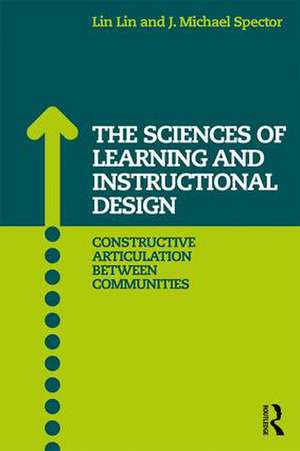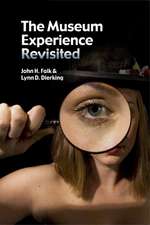The Sciences of Learning and Instructional Design: Constructive Articulation Between Communities
Editat de Lin Lin, J. Michael Spectoren Limba Engleză Paperback – 22 iun 2017
| Toate formatele și edițiile | Preț | Express |
|---|---|---|
| Paperback (1) | 415.29 lei 6-8 săpt. | |
| Taylor & Francis – 22 iun 2017 | 415.29 lei 6-8 săpt. | |
| Hardback (1) | 1109.99 lei 6-8 săpt. | |
| Taylor & Francis – 22 iun 2017 | 1109.99 lei 6-8 săpt. |
Preț: 415.29 lei
Nou
Puncte Express: 623
Preț estimativ în valută:
79.49€ • 82.67$ • 66.61£
79.49€ • 82.67$ • 66.61£
Carte tipărită la comandă
Livrare economică 14-28 martie
Preluare comenzi: 021 569.72.76
Specificații
ISBN-13: 9781138924321
ISBN-10: 1138924326
Pagini: 244
Ilustrații: 23
Dimensiuni: 152 x 229 x 21 mm
Greutate: 0.75 kg
Ediția:1
Editura: Taylor & Francis
Colecția Routledge
Locul publicării:Oxford, United Kingdom
ISBN-10: 1138924326
Pagini: 244
Ilustrații: 23
Dimensiuni: 152 x 229 x 21 mm
Greutate: 0.75 kg
Ediția:1
Editura: Taylor & Francis
Colecția Routledge
Locul publicării:Oxford, United Kingdom
Public țintă
PostgraduateCuprins
Chapter 1: Historical Introduction
J. Michael Spector and Lin Lin
Chapter 2: The Sciences of Learning
Pablo N. Pirnay-Dummer and Norbert M. Seel
Chapter 3: Finding a Middle Ground: Wars Never Settle Anything
Paul A. Kirschner and Kristine Lund
Chapter 4: Comparing the Goals and Methodologies of Learning Scientists and Educational Technology Researchers
Thomas C. Reeves and Eunjung Grace Oh
Chapter 5: Learning Sciences and Instructional Design: Big Challenges, Multi-field, Multidisciplinary Solutions
Wellesley R. Foshay and Jeremy Roschelle
Chapter 6: Implications: Cherishing the Middle Ground
Jan Elen
Chapter 7: Reconsidering Design and Evaluation
Andrew S. Gibbons and David D. Williams
Chapter 8: Learning Science Applications for Research in Medicine
Susanne P. Lajoie
Chapter 9: An Asian Perspective on the Divide
Allan H.K. Yuen
Chapter 10: The Collaboration Imperative
Ellen B. Meier
Chapter 11: Synthetic Environmnts for Skills Training and Practice
Robert Hubal and Thomas Parsons
Chapter 12: Instructional Design and Learning Design
Nancy Law
Chapter 13: Learning Analytics Design
Dirk Ifenthaler
Chapter 14: Continuing the Discourse
Lin Lin and J. Michael Spector
J. Michael Spector and Lin Lin
Chapter 2: The Sciences of Learning
Pablo N. Pirnay-Dummer and Norbert M. Seel
Chapter 3: Finding a Middle Ground: Wars Never Settle Anything
Paul A. Kirschner and Kristine Lund
Chapter 4: Comparing the Goals and Methodologies of Learning Scientists and Educational Technology Researchers
Thomas C. Reeves and Eunjung Grace Oh
Chapter 5: Learning Sciences and Instructional Design: Big Challenges, Multi-field, Multidisciplinary Solutions
Wellesley R. Foshay and Jeremy Roschelle
Chapter 6: Implications: Cherishing the Middle Ground
Jan Elen
Chapter 7: Reconsidering Design and Evaluation
Andrew S. Gibbons and David D. Williams
Chapter 8: Learning Science Applications for Research in Medicine
Susanne P. Lajoie
Chapter 9: An Asian Perspective on the Divide
Allan H.K. Yuen
Chapter 10: The Collaboration Imperative
Ellen B. Meier
Chapter 11: Synthetic Environmnts for Skills Training and Practice
Robert Hubal and Thomas Parsons
Chapter 12: Instructional Design and Learning Design
Nancy Law
Chapter 13: Learning Analytics Design
Dirk Ifenthaler
Chapter 14: Continuing the Discourse
Lin Lin and J. Michael Spector
Notă biografică
Lin Lin is Associate Professor of Learning Technologies at the University of North Texas, USA.
J. Michael Spector is Professor and former Chair of Learning Technologies at the University of North Texas, USA.
J. Michael Spector is Professor and former Chair of Learning Technologies at the University of North Texas, USA.
Recenzii
"Hats off to Drs. Lin and Spector for this wonderful contribution to the ongoing dialogues around two complimentary fields: Learning Sciences and Instructional Design & Technology. This edited text offers significant glimpses into what could be a future of true collaboration, and the framing by Drs. Lin and Spector addresses the fundamental issues around why these two fields haven’t collaborated earlier and how we can overcome those challenges in the future. Well done!"
—Alison A. Carr-Chellman, Dean, College of Education and Professor, Curriculum & Instruction, University of Idaho, USA
"Lin and Spector have admirably accomplished their goal of bridging the gap between the communities of the learning sciences, and instructional design and technology. The authors in this volume represent the leading lights in both communities as well as the "middle ground," tackling the tensions inherent to the various perspectives in deeply intellectual and highly practical discussions. The chapters are at once accessible for novices and thought-provoking for experts. It is essential reading for those devoted to improving human learning."
—Wilhelmina C. Savenye, Professor of Educational Technology, Division of Educational Leadership and Innovation, Arizona State University, USA
—Alison A. Carr-Chellman, Dean, College of Education and Professor, Curriculum & Instruction, University of Idaho, USA
"Lin and Spector have admirably accomplished their goal of bridging the gap between the communities of the learning sciences, and instructional design and technology. The authors in this volume represent the leading lights in both communities as well as the "middle ground," tackling the tensions inherent to the various perspectives in deeply intellectual and highly practical discussions. The chapters are at once accessible for novices and thought-provoking for experts. It is essential reading for those devoted to improving human learning."
—Wilhelmina C. Savenye, Professor of Educational Technology, Division of Educational Leadership and Innovation, Arizona State University, USA
Descriere
The Sciences of Learning and Instructional Design: Constructive Articulation Between Communities addresses the growing divide between the learning sciences community and the instructional design and technology community, bringing leading scholars from both fields together in one volume in an attempt to find productive middle ground.












